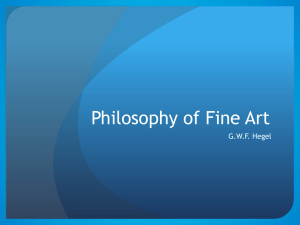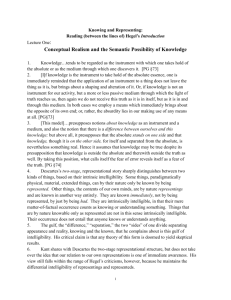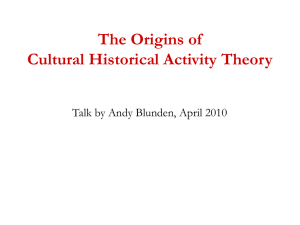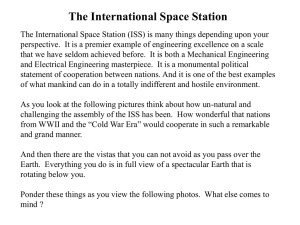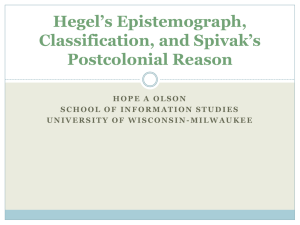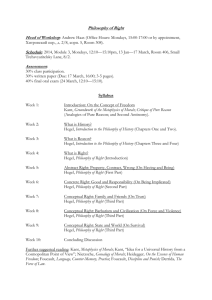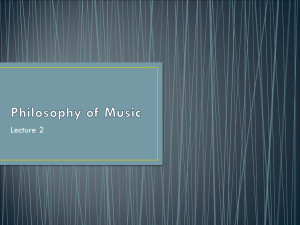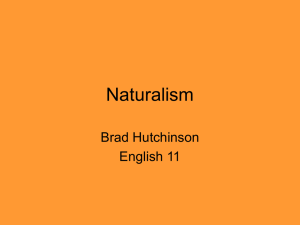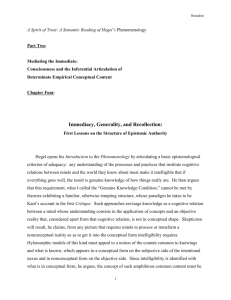Omar AC
advertisement
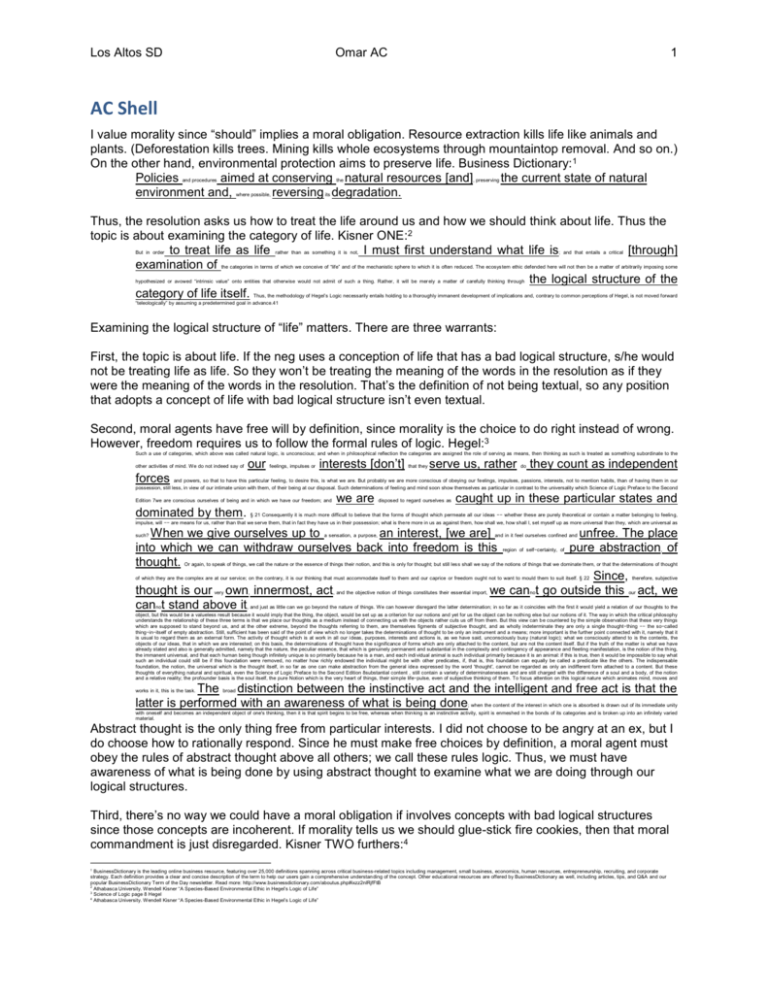
Los Altos SD 1 Omar AC AC Shell I value morality since “should” implies a moral obligation. Resource extraction kills life like animals and plants. (Deforestation kills trees. Mining kills whole ecosystems through mountaintop removal. And so on.) On the other hand, environmental protection aims to preserve life. Business Dictionary: 1 Policies aimed at conserving natural resources [and] the current state of natural environment and, reversing degradation. and procedures the where possible, , preserving its Thus, the resolution asks us how to treat the life around us and how we should think about life. Thus the topic is about examining the category of life. Kisner ONE:2 to treat life as life I must first understand what life is [through] examination of the logical structure of the category of life itself. But in order rather than as something it is not, ; and that entails a critical the categories in terms of which we conceive of “life” and of the mechanistic sphere to which it is often reduced. The ecosys tem ethic defended here will not then be a matter of arbitrarily imposing some hypothesized or avowed “intrinsic value” onto entities that otherwise would not admit of such a thing. Rather, it will be mer ely a matter of carefully thinking through Thus, the methodology of Hegel’s Logic necessarily entails holding to a thoroughly immanent development of implications and, contrary to common perceptions of Hegel, is not moved forward “teleologically” by assuming a predetermined goal in advance.41 Examining the logical structure of “life” matters. There are three warrants: First, the topic is about life. If the neg uses a conception of life that has a bad logical structure, s/he would not be treating life as life. So they won’t be treating the meaning of the words in the resolution as if they were the meaning of the words in the resolution. That’s the definition of not being textual, so any position that adopts a concept of life with bad logical structure isn’t even textual. Second, moral agents have free will by definition, since morality is the choice to do right instead of wrong. However, freedom requires us to follow the formal rules of logic. Hegel:3 Such a use of categories, which above was called natural logic, is unconscious; and when in philosophical reflection the categories are assigned the role of serving as means, then thinking as such is treated as somethi ng subordinate to the other activities of mind. We do not indeed say of forces our feelings, impulses or interests [don’t] that they serve us, rather do they count as independent and powers, so that to have this particular feeling, to desire this, is what we are. But probably we are more conscious of obeying our feelings, impulses, passions, interests, not to mention habits, than of having them in our possession, still less, in view of our intimate union with them, of their being at our disposal. Such determinations of feeling and mind soon show themselves as particular in contrast to the universality which Science of Logic Preface to the Second Edition 7we are conscious ourselves of being and in which we have our freedom; and dominated by them. we are disposed to regard ourselves as caught up in these particular states and § 21 Consequently it is much more difficult to believe that the forms of thought which permeate all our ideas −− whether these are purely theoretical or contain a matter belonging to feeling, impulse, will −− are means for us, rather than that we serve them, that in fact they have us in their possession; what is there more in us as against them, how shall we, how shall I, set myself up as more universal than they, which are universal as When we give ourselves up to an interest, [we are] into which we can withdraw ourselves back into freedom is this thought. such? a sensation, a purpose, unfree. The place pure abstraction of and in it feel ourselves confined and region of self−certainty, of , Or again, to speak of things, we call the nature or the essence of things their notion, and this is only for thought; but still les s shall we say of the notions of things that we dominate them, or that the determinations of thought Since, we can t go outside this act, we of which they are the complex are at our service; on the contrary, it is our thinking that must accommodate itself to them and our caprice or freedom ought not to want to mould them to suit itself. § 22 thought is our own innermost, act can t stand above it very no , , and the objective notion of things constitutes their essential import, no therefore, subjective our , and just as little can we go beyond the nature of things. We can however disregard the latter determination; in so far as it coincides with the first it would yield a relation of our thoughts to the object, but this would be a valueless result because it would imply that the thing, the object, would be set up as a criterion for our notions and yet for us the object can be nothi ng else but our notions of it. The way in which the critical philosophy understands the relationship of these three terms is that we place our thoughts as a medium instead of connecting us with the objects rather cuts us off from them. But this view can b e countered by the simple observation that these very things which are supposed to stand beyond us, and at the other extreme, beyond the thoughts referring to them, are themselves figments of subjective thought, and as wholly indeterminate they are only a single thought−thing −− the so−called thing−in−itself of empty abstraction. Still, sufficient has been said of the point of view which no longer takes the determinations of thought to be only an instrument and a means; more important is the further point c onnected with it, namely that it is usual to regard them as an external form. The activity of thought which is at work in all our ideas, purposes, interests and actions is, as we have said, unconsciously busy (natural logic); what we consciously attend to is the contents, the objects of our ideas, that in which we are interested; on this basis, the determinations of thought have the significance of forms which are only attached to the content, but are not the content itself. But if the truth of the matter is what we have already stated and also is generally admitted, namely that the nature, the peculiar essence, that which is genuinely permanent and substantial in the complexity and contingency of appearance and fleeting manifestation, is the notion of the thing, the immanent universal, and that each human being though infinitely unique is so primarily because he is a man, and each indi vidual animal is such individual primarily because it is an animal: if this is true, then it would be impossible to say what such an individual could still be if this foundation were removed, no matter how richly endowed the individual might be with other predicates, if, that is, this foundation can equally be called a predicate like the others. The indispensable foundation, the notion, the universal which is the thought itself, in so far as one can make abstraction from the general idea expressed by the word 'thought', cannot be regarded as only an indifferent form attached to a content. But these thoughts of everything natural and spiritual, even the Science of Logic Preface to the Second Edition 8substantial content , still contain a variety of determinatenesses and are still charged with the difference of a soul and a body, of the notion and a relative reality; the profounder basis is the soul itself, the pure Notion which is the very heart of things, their sim ple life−pulse, even of subjective thinking of them. To focus attention on this logical nature which animates mind, moves and The distinction between the instinctive act and the intelligent and free act is that the latter is performed with an awareness of what is being done works in it, this is the task. broad ; when the content of the interest in which one is absorbed is drawn out of its immediate unity with oneself and becomes an independent object of one's thinking, then it is that spirit begins to be free, whereas when thin king is an instinctive activity, spirit is enmeshed in the bonds of its categories and is broken up into an infinitely varied material. Abstract thought is the only thing free from particular interests. I did not choose to be angry at an ex, but I do choose how to rationally respond. Since he must make free choices by definition, a moral agent must obey the rules of abstract thought above all others; we call these rules logic. Thus, we must have awareness of what is being done by using abstract thought to examine what we are doing through our logical structures. Third, there’s no way we could have a moral obligation if involves concepts with bad logical structures since those concepts are incoherent. If morality tells us we should glue-stick fire cookies, then that moral commandment is just disregarded. Kisner TWO furthers:4 1 BusinessDictionary is the leading online business resource, featuring over 25,000 definitions spanning across critical business-related topics including management, small business, economics, human resources, entrepreneurship, recruiting, and corporate strategy. Each definition provides a clear and concise description of the term to help our users gain a comprehensive understanding of the concept. Other educational resources are offered by BusinessDictionary as well, including articles, tips, and Q&A and our popular BusinessDictionary Term of the Day newsletter. Read more: http://www.businessdictionary.com/aboutus.php#ixzz2nlRjfFtB 2 Athabasca University. Wendell Kisner “A Species-Based Environmental Ethic in Hegel’s Logic of Life” 3 Science of Logic page 8 Hegel 4 Athabasca University. Wendell Kisner “A Species-Based Environmental Ethic in Hegel’s Logic of Life” Los Altos SD 2 Omar AC if the conceptual features necessary for an adequate understanding of life cannot be exhaustively specified in terms of [being a tool] then living beings can t be treated as [tools] without eviscerating the understanding of life If life is not reducible to mechanism—that is, mechanistic determinacy— no mere mechanisms . Insofar as what Hegel calls “external teleology” or “finite purposiveness” makes use of a mechanical process as something external and indifferent whose purposes lie outside it, that sort of reductive instrumentality is ontologically inappropriate with respect to life. In other words, if I treat a living being, the determinacy of which, as I will show, necessarily includes its own specific environment, as a mere means for purposes I externally impose upon it, then I am not treating it as life but as mere mechanism. But in ord er to treat life as life rather than as something it is not, [Thus] I must first understand what life is; and that entails a critical examination of the categories in terms of which we conceive of “life” and of the mechanistic sphere to which it is often reduced. The ecosystem ethic defended here will not then be a matter of arbitrarily imposing some hypothesized or avowed “intrinsic value” onto entities that otherwise would not admit of such a thing. Rather, it will be merely a mat- ter of carefully think through the logical structure ing of the category of life itself. Thus, the methodology of Hegel’s Logic necessarily entails holding to a thoroughly immanent development of implications and, contrary to common perceptions of Hegel, is not moved forward “teleologically” by assuming a predetermined goal in advance.41 Thus the standard is evaluating whether the category of life permits its own killing. This entails that we evaluate which interpretation of life is most complete and universal. Kisner THREE clarifies:5 a human can be treated as a mere physical object, and at a certain level a human is a physical object, such a level fixates upon an under-determination. The mistake lie[s] in the [false] reduction of the human as if [being an object] were exhaustive or “essential.” In such a case the human is no longer treated as human. But to the degree that life is treated this way, it is no longer being treated as life. Analogously, of abstraction being being that is, does not being to this level of determinacy alone being of abstraction in the mere recognition that this level of determinacy is operative in a human being, but rather it being Likewise with respect to the living organism, Hegel says that when something in the objective world does act upon it mechanically, “it is not acting on it as on a living being.”46 Mechanism does not provide the basis for the determination of life, but insofar as it is a necessary aspect of life it can make itself known in this way. So to recap: the topic asks us how to think about life. Resource extraction thinks it’s cool to kill life, while environmental protection aims to preserve life. We’re obligated to have an accurate understanding of life that isn’t paradoxical. Thus, if understanding life as something that can be killed is bad, you affirm in order to preserve it. I contend life’s essence is only coherent if we accept its right not to be killed. First, to believe something is merely a tool or machine is incoherent. Kisner FOUR: an engine “runs” Each element in this mechanical process—the spark plug, the gas the piston is completely indifferent to any activity of those elements the piston does n t care whether it s used to drive a car or even if it s used at all This is the conceptual determinacy we presuppose in the everyday no- tion of a machine. For instance, automobile when the spark plugs fire igniting the gasoline whose explosion drives the pistons which in turn rotate the axle and turn the wheels. oline, , etc.—is external to the other elements and with respect to it. Any purpose that the piston’s movement may serve—e.g. turning the axle and thereby imparting motion to my car so I can drive to work—is something to which it remains utterly indifferent. To put it in more colloquial terms, o i i for anything.50 Even the self-regulation of a cybernetic system, such as a steam engine that regulates its own flow of fuel relative to its speed (or the “cruise control” function on many automobiles today), is characterized by the indifferent externality of its functional elements in this way. But at the same time, it is through this very indifferent externality that each element appears as a subsistent object in its own right independent of the other objects in the mechanical process. The very independent self- subsistence implied by the conception of an object, its objectcharacter as something that is “there” independently of any observing consciousness or of any other object, is gained through its externality to other objects and its indiff erence that makes it the same object regardless of what they do. Even when it is destroyed, as when a stone is shattered, each resulting fragment is again an object that is external and indifferent to the others. Hence, at this level of analysis, the same determinacy is merely repeated even if other (em- pirical) characteristics are altered, much as Descartes’s famous wax maintains its character of external extension across its sensory modifications.51 But herein lies the self-contradiction implicit in this determinacy, a con- tradiction implied by its the [piston] is independent through its indifference and externality; But [the paradox is that] it must be determined to be a mechanical object externally, and therefore is not independent as it is determined externally [have self-subsistence] its self-subsistence is undermined, yet it is this very externality that gives it self-subsistence in the first place. character as a self-subsistence established through indifferent externality. The contradiction is twofold. On the one hand, mechanical object self-subsistent or because of its thoroughgoing indifferent externality it is indifferent and external not only to other objects but to its own determinacy as indifferent externality as well. this can only mean that self-subsistent or . That is, insofar to be what it is, Second, the most complete conception of life is to recognize its self-imposed will to live. Kisner FIVE:6 life is a purposive activity and so is not merely mechanistic life is a purposive activity that it is its own end. To live is to be a self-maintaining organism whose end is to live. organisms live simply to live. Life is initially manifest in the ontological sequence as “realized purpose.” That is, driven from behind in a fashion. But rather than the external purposiveness whose content, the end sought, is other than the form of purpose or the purposive activity itself, ... do not in order to do or achieve anything else; they are objective beings that live in order Living 70 Hegel’s treatment of teleolnovogy shows that purpose must have a means of objectifying itself if it is to truly be purposive at all, and therefore it needs something external and objective, viz. it needs the mechanico-chemical sphere (external objectivity). On the other hand, insofar as external objectivity shows itself to be a self-negating process, it cannot stand on its own independently of the purposive activity which is its truth. Thus the semblance that external objectivity can be something self-subsistent independently of purposive activity falls away. The seeming Purposive activity consists in letting the self-negating mechanic process show itself to be self-negating thereby establishing a semblance of its independence and then canceling that semblance independence of external objectivity is both brought about and canceled by purposive activity, and it is precisely in this that the latter’s purposive character consists. is then seen as being one and the same thing as the self-negating mechanico-chemical process itself: in purposive activity the self-negatin`g character of mechanism becomes explicit as such, and so such activity o-chemical that, viz. a process whose truth is life, . With the full identity of purposive activity and the self-negating mechanico-chemical process in the living organism, we get a full identity of form and content. Thus, I co-opt any reason to treat life as mere tool that can be killed, so I at least have a risk of offense. 5 6 Athabasca University. Wendell Kisner “A Species-Based Environmental Ethic in Hegel’s Logic of Life” Athabasca University. Wendell Kisner “A Species-Based Environmental Ethic in Hegel’s Logic of Life” page 26

